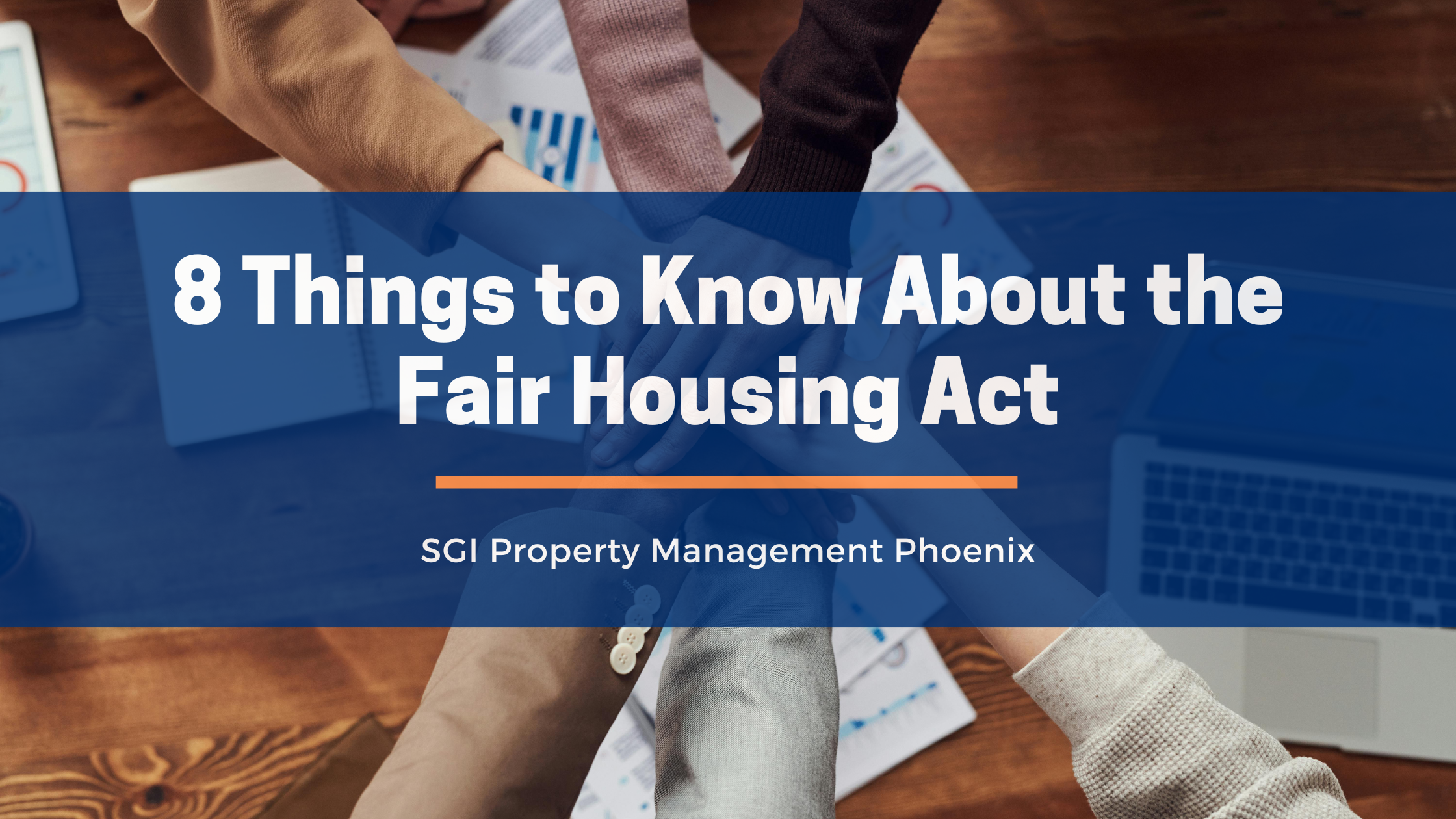
One of the most significant and impactful laws in the landlord-tenant relationship is inarguably the Fair Housing Act (FHA). It was designed to ensure every American has equal access to housing regardless of certain protected classes.
As a landlord in Pheonix, this is a crucial piece of legislation that you should familiarize yourself for a successful landlording experience.
In this blog, we’ll cover 8 things landlords in Pheonix should know about the Fair Housing Act.
1. What is the Fair Housing Act and how does it affect landlords?
This is a common question among budding landlords!
The Fair Housing Act was passed on April 11th, 1968 after several failed attempts in Congress. Before its passage, housing discrimination was rampant all across the United States. It was commonplace for landlords of certain groups to disqualify prospective tenants based on their skin color, sex, or nationality.
However, with the act’s passage, it became illegal for landlords to engage in such discriminatory actions. Landlords and other housing providers now had to base their qualifying standards on fairness and equality rather than on the physical attributes of an applicant.
At the federal level, the Fair Housing Act is enforced by the Department of Housing and Urban Development (HUD). Some states also have institutions that can handle housing discrimination complaints at the local level.
2. What classes are protected under the Fair Housing Act?
At its signing by President Johnson on April 11th, 1968, the Fair Housing Act only provided protection based on four classes. That is, race, color, sex, and nationality. The list of protections was further expanded later to include three classes: religion, familial status, and disability.
This now brought the number of protections at the federal level to 7.

Some states have also expanded on the list by adding their own protected classes. The following are some of the additional protections that can exist at the state level.
Ancestry
Immigration status
Primary language
Sexual orientation
Income source
Marital status
Citizenship status
Gender identity
As such, as a landlord it’s crucial to familiarize yourself with your state’s anti-discrimination laws for compliance.
3. What discriminatory practices should you avoid as a landlord?
As a landlord, certain practices are a no-no when renting out a property. The following are some of the actions that the HUD can flag as discriminatory.
Refusing to rent out your property to a tenant with a bonafide offer. Sure, every landlord dreams of renting to a dream tenant. However, your selection criteria must be fair to all applicants.
Providing applicants with different selection criteria. You must have a consistent screening process. Asking tenants different questions can be a ground for potential discrimination complaints. If you ask one tenant a question, you must do the same for all other applicants. The same is also true with any documentation you may require, such as pay stubs, credit reports, or W-2 forms.
Using discriminatory language when advertising the vacant unit. You cannot, for instance, say that you prefer single professionals over unmarried ones or those with children. This would be outright bias and a recipe for lawsuits.
Trying to evict a tenant based on a protected class. An eviction process against a tenant must be based on a legitimate cause. Trying to evict a tenant for other reasons is bound to fail. It might even get you in trouble with the legal system should the tenant decide to sue.
Instituting policies that result in unfair access to housing opportunities. You cannot, for instance, refuse families with children because of “noise.”
4. What special rights do disabled tenants have when renting out a home?
The FHA provides tenants with disabilities certain rights when renting a property. Specifically, disabled tenants have a right to reasonable modifications and accommodations.

When it comes to reasonable modifications, it may mean installing grab bars in the bathroom or installing a ramp into a building. As for reasonable accommodations, it may mean making adjustments to policies. Such as, assigning the tenant a dedicated parking space or suspending your “no pets” policy.
5. Are there any exemptions to the fair housing laws?
Yes, certain exemptions do exist. They include the following.
Owner-occupied buildings. If you reside in one of the units that you rent out, you may be exempted from the provisions of the Fair Housing Act. The total number of units, however, must not exceed four units.
Single-family homes. If you own a single-family home and manage to rent it out without using brokerage services, you may qualify for a FHA exemption.
Religious organizations. Fair housing laws don’t apply in this regard. However, the members must not discriminate against other members of the same organization.
Private clubs. These are similar to religious organizations. They can restrict rentals to their members.
6. What are the penalties for fair housing violations?
Violating fair housing laws can attract serious legal and/or financial repercussions. You could be liable to significant fines depending on the severity of the case. Repeat offenders can be fined amounts of up to hundreds of thousands of dollars.
Another consequence for violating the fair housing laws are potential civil lawsuits. These can set you back seriously through financial settlements.
7. Do rental ads have to comply with the FHA?
Absolutely! Your rental ads must comply with the provisions of the fair housing laws. You must avoid a language that discriminates or shows preference or limitation based on any protected classes.

Avoid phrases like “ideal for single professionals,” “no kids allowed,” or “Christians preferred.” Instead, focus on advertising the property’s features and benefits.
8. Hire a property management company.
If you are a self-manager or an out-of-state investor, keeping up with the fair housing laws can be laborious. Small mistakes can end up setting you back by tens of thousands of dollars. Not to mention the reputational damage you can suffer.
Bottom Line
When renting out a property, it’s important to know the Fair Housing Act for purposes of staying legally compliant. But unless you have a legal background or years of experience as a landlord, hiring a property manager is ideal.
At SGI Property Management Phoenix, we can help you rent out your Phoenix property reliably and professionally. Contact us now to learn more!









